Abolitionist Persuasions
- Gradualism of Quaker Benjamin Lundy and Amercan Colonization Society
- Immediatism of William Garrison and American Anti-Slavery Society
- Direct Action of Gerit Smith and the Liberty party
- Violence of John Brown, provoking slave uprising at Harpers Ferry
|
 [British Colonization Society image]
[British Colonization Society image]
1773 - Phillis Wheatley's "Poems" published in Britain
- became symbol of black genius and achievement
1775 - Pennsylvania Society (Quakers; B. Franklin)
1777 - Vermont 1st northern state to abolish slavery
- PA 1780, MA 1783, CT & RI 1784, NY 1785, NJ 1786
1787 - Northwest Ordinance prohibits slavery north of the Ohio River
1794 - France abolishes slavery in West Indies
- slave rebellion in Santo Domingo by Toussaint L'Ouverture until 1802
1808 - slave trade abolished
1815 - Paul Cuffe - wealthy black New Bedford shipper
- took blacks to Sierra Leone, but $100 cost each too high
1817 - American Colonization Society founded
- Virgina asked federal government to acquire land in Africa to relocate free blacks unwanted in Virgina
- Bushrod Washington, Henry Clay, President James Monroe (but not JQ Adams)
- funds from donors, U.S. Congress, VA and MD state legislatures
- opposed by free blacks such as Theodore Wright, Samuel Cornish
1821 - Quaker Benj. Lundy's "Genius of Universal Emancipation"
- colonization, self-improvement projects, compensation
- need to educate and train
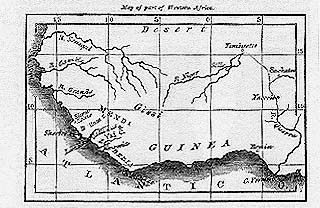
1822 - Liberia purchased - became independent republic 1846
- 2228 sent by 1832, 12,000 by 1860
1823 - British Anti-Slavery Society
1825 - Charles Finney's Great Revival
- converted Theodore Weld, NY silk merchants Lewis and Arthur Tappan
1827 - Samuel Cornish starts"Freedom's Journal"
1829 - David Walker writes "Appeal" - was self-taught black
- advocated violence - "kill or be killed"
- made South defensive -2 states prohibit "incendiary" literature
1829 - Mexico ends slavery
1830 - National Negro Convention movement
- need for racial unity by black abolitionists
- opposed ACS, gradualism - example of black militancy
 Nat Turner rebellion
Nat Turner rebellion
|
1831 - Nat Turner rebellion Aug. 13-23 killed 57 whites in Virginia
- most violent revolt since Denmark Vesey plot discovered 1822 and 37 slaves executed
1831 - British emancipation of West Indies
- successful after British women boycotted W. Indies sugar
- 8 year apprenticeship; £20m. compensation
- free blacks celebrate Jamaica's August 1, 1834 (not July 4)
- British immediatists influence Americans
1831 - William L. Garrison breaks from Lundy and starts "Liberator"
- "I will be heard" - opposed colonization - was jailed for libel when accused Mass. shipowners of illegal slave trade
- emphasized moral suasion rather than coercion, social reform rather than politics, individual responsibility of the Second Great Awakening
- boycotts, ride-ins, speak-ins, schools, churches
1832 - Garrison starts New England Anti-Slavery Society
1833 - American Anti-Slavery Society founded by immediatists
- Garrison, Tappans, Weld, Stanton - sent agents (the "70" from Lane)
- 250,000 members in 1350 societies by 1838
- published "Emancipator" in New York (NY-Ohio axis)
- published "American Slavery As It Is" 1839 - 100,000 copies sold per year, more than any other pamphlet, factual from slaveowners themselves and from southern newspapers
1833 - Lane Seminary and Oberlin Institute in Ohio
- admitted blacks, women; funded by Tappans
1833 - Thomas Morris elected Ohio senator - Democrat
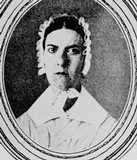 Angelina Grimke
Angelina Grimke
|
1833 - James Birney moves from Alabama to Kentucky
- published tracts, but press destroyed 1836
1833 - Prudence Crandall school case in Canterbury, CT.
- town passed law preventing black out-of-state students - lost trial
- moved to Illinois 1834 with abol. husband Rev. Calvin Philleo
- showed inadequacy of moral suasion, need for laws, political action
1833 - Philadelphia Female Anti-Slavery Society - Lucretia Mott
- Sarah and Angelina Grimke - 1st female agents
- to NY 1836 and began parlor talks, to Mass. 1837 and spoke in public to "promiscuous audiences (men and women)
- trained by Theodore Weld who married Angelina 1838, renounced legal rights of husband over wife's property
 1835 - Gerrit Smith organized NYAS at Peterboro after mob broke up Utica meeting
1835 - Gerrit Smith organized NYAS at Peterboro after mob broke up Utica meeting
1835 - Senate passes mail censorship law to stop AASS
1835 - SC, LA re-enact Negro Seaman's Law
- all blacks imprisoned until ship sailed
- MI requires $100 bond from free blacks
1836 - Congress ends right of petition over opp. of John Q. Adams
- Adams joined by Joshua Giddings, Whig from Ohio, in House of Rep.
1837 - Elijah Lovejoy murdered in Alton, Illinois - 1st martyr
1837 - Pastoral Letter closes churches to Grimke sisters because they spoke in public
- Sarah in 1838 wrote her "Letters..." that said the clergy had misinterpreted the Bible: "men and women were created equal."
1838 - Garrison joins Henry Wright's Peace Convention
- Abby Kelley, MA Quaker, also against child punishment
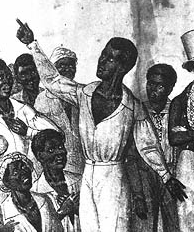 Cinque addressing slaves
Cinque addressing slaves
|
1838 - Lucretia Mott's Free Produce Society
1839 - Amistad case - revolt led by Cinque on slave ship from Havana - seized by U.S. - CT judge Andrew Judson set all free
1840 - schism between Garrison and gradualists
- Garrison admits women, attacks Constitution, rejects all coercion
1840 - Liberty Party wins 7069 votes for James Birney
- would get 62,300 votes in 1844
1840 - World Anti-Slavery Convention in London
1841 - Fred. Douglass hired by Garrison as lecturer
- 1st fugitive-slave speaker in U.S.
- had fled Lloyd plantation on MD Eastern Shore in 1838
- "I kept my eye on the bright north star and thought of liberty"
1841 - Creole revolt on slave ship from Virginia to New Orleans
1842 - Webster-Ashburton Treaty tightened enforcement of the Atlantic slave trade ban
1842 - Rev. Charles Torrey, "father of the Underground Railroad" imprisoned in Maryland and dies
1842 - Prigg v. PA case overturns 1793 law
- states no longer must aid return of fugitives
- causes state personal liberty laws (until Abelman v. Booth 1859)
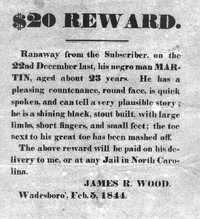 Reward offered for runaways
Reward offered for runaways
|
1843 - railroads integrate after "ride-ins"
1844 - Congress restores right of petition
1845 - Fred. Douglass published his "Narrative"- accurate, factual
1845 - Cassius Clay published True American in Kentucky
1846 - Gerrit Smith's land grants in New York
1846 - American Missionary Association founded by Tappans
1847 - Douglass published "North Star" paper in Rochester
- integrates Rochester schools
1847 - Henry D. Thoreau jailed for not paying taxes to pro-slave government
- writes essay "On Civil Disobedience"
1848 - Free Soil Party wins 291,263 for Van Buren
- John Hale would get 155,825 in 1852
1848 - Seneca Falls Convention for women's rights
- Declaration of Sentiments and Resolutions based on Dec. of Indep.
- signed by F. Douglass: "Right is of no sex, truth is of no colour."
1850 - Fugitive Slave Law
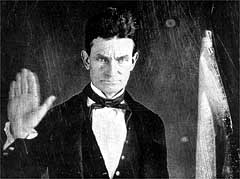 John Brown
John Brown
|
1851 - Gerrit Smith's Radical Abolition Party to replace Liberty Party
1852 - Fred. Douglass refused dining room service in Alliance, OH hotel on way to Free Soil convention - began boycott
1854 - Anthony Burns removed from Boston by force
1855 - Boston schools desegregated by Charles Sumner and black layer Robert Morris
1856 - John Brown's Pottawatomie, KA massacre
1859 - John Brown's Harpers Ferry raid supported by "Secret Six"
Firebells
Links:
revised 11/23/03 by Schoenherr | Civil War

 1835 - Gerrit Smith organized NYAS at Peterboro after mob broke up Utica meeting
1835 - Gerrit Smith organized NYAS at Peterboro after mob broke up Utica meeting